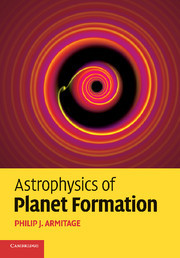Description
Astrophysics of Planet Formation
Author: Armitage Philip J.
Language: English
Subject for Astrophysics of Planet Formation:
Approximative price 45.81 €
In Print (Delivery period: 14 days).
Add to cart
Astrophysics of Planet Formation
Publication date: 10-2013
Support: Print on demand
Publication date: 10-2013
Support: Print on demand
Approximative price 74.82 €
Subject to availability at the publisher.
Add to cart
Astrophysics of planet formation
Publication date: 12-2009
296 p. · 17x24.4 cm · Hardback
Publication date: 12-2009
296 p. · 17x24.4 cm · Hardback
Description
/li>Contents
/li>Biography
/li>
The study of planet formation has been revolutionized by recent observational breakthroughs, which have allowed the detection and characterization of extrasolar planets, the imaging of protoplanetary disks, and the discovery of the Solar System's Kuiper Belt. Written for beginning graduate students, this textbook provides a basic understanding of the astrophysical processes that shape the formation of planetary systems. It begins by describing the structure and evolution of protoplanetary disks, moves on to the formation of planetesimals, terrestrial and gas giant planets, and concludes by surveying new theoretical ideas for the early evolution of planetary systems. Covering all phases of planet formation - from protoplanetary disks to the dynamical evolution of planetary systems - this introduction can be understood by readers with backgrounds in planetary science, and observational and theoretical astronomy. It highlights the physical principles underlying planet formation and the areas where more research and new observations are needed.
Preface; 1. Observations of planetary systems; 2. Protoplanetary disk structure; 3. Protoplanetary disk evolution; 4. Planetesimal formation; 5. Terrestrial planet formation; 6. Giant planet formation; 7. Early evolution of planetary systems; Appendixes; References; Index.
Philip J. Armitage is a Professor in the Department of Astrophysical and Planetary Sciences at the University of Colorado, Boulder, and a Fellow of JILA. His research focuses on theoretical and computational studies of protoplanetary disks, planet formation and black hole astrophysics. He has extensive teaching experience at the advanced undergraduate and graduate level.
© 2024 LAVOISIER S.A.S.
These books may interest you

Astrophysics of Planet Formation 86.49 €



